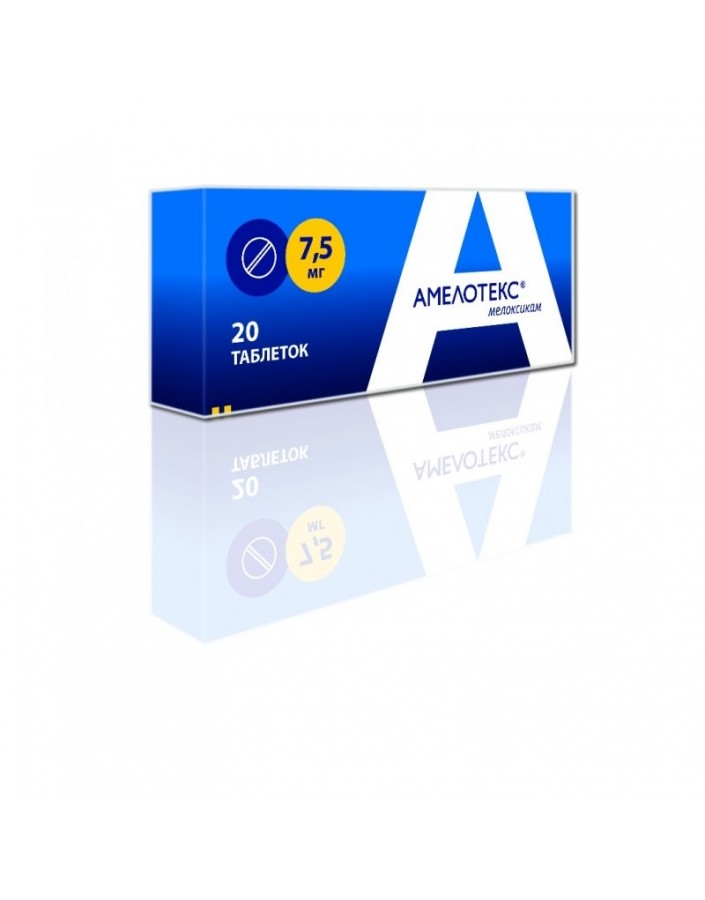



AMELOTEX TABLETS 7.5MG - 20 TABS

Security policy (edit with Customer reassurance module)

Delivery policy (edit with Customer reassurance module)

Return policy (edit with Customer reassurance module)
Pills:
1 pill contains as active substance meloxicam - 7.5 mg or 15 mg.
Excipients: lactose monohydrate, microcrystalline cellulose, sodium citrate, povidone, crospovidone, colloidal silicon dioxide, Magnesium stearate;
10 or 20 pcs. packaged.
Amelotex is a nonsteroidal anti-inflammatory drug that has anti-inflammatory, antipyretic, analgesic effects.
The anti-inflammatory effect is associated with inhibition of the enzymatic activity of cyclooxygenase-2 (COX-2), which is involved in the biosynthesis of prostaglandins in the area of inflammation.
To a lesser extent, meloxicam acts on cyclooxygenase-1 (COX-1), which is involved in the synthesis of prostaglandin, which protects the mucous membrane of the gastrointestinal tract and is involved in the regulation of blood flow in the kidneys.
Rheumatoid arthritis; osteoarthritis; ankylosing spondylitis (ankylosing spondylitis); inflammatory and degenerative diseases of the joints, accompanied by pain. Designed for symptomatic therapy, reducing pain and inflammation at the time of use, does not affect the progression of the disease.
Hypersensitivity to the active substance or auxiliary components;
Contraindicated in the period after coronary artery bypass surgery;
uncompensated heart failure;
Complete or incomplete combination of bronchial asthma, recurrent nasal polyposis and paranasal sinuses and intolerance to Acetylsalicylic acid and other nonsteroidal anti-inflammatory drugs (including history);
Erosive and ulcerative changes in the mucous membrane of the stomach or duodenum 12, active Gastrointestinal bleeding;
Inflammatory bowel disease (ulcerative colitis, Crohn's disease);
Cerebrovascular bleeding or other bleeding;
Severe liver failure or active liver disease;
Severe renal failure in patients not undergoing dialysis (creatinine clearance less than 30 ml / min), progressive kidney disease including. confirmed hyperkalemia;
Pregnancy, breastfeeding period;
Children's age up to 15 years.
With caution
To reduce the risk of adverse events, use the minimum effective dose of the shortest possible course for coronary heart disease, cerebrovascular diseases, congestive heart failure, dyslipidemia / hyperlipidemia, diabetes, peripheral arterial disease, smoking, creatinine clearance less than 60 ml / min.anamnestic data on the development of ulcerative lesions of the gastrointestinal tract, in the presence of Helicobacter pylori infection, in the elderly, with prolonged use of nonsteroidal anti-inflammatory drugs, frequent use of alcohol, severe somatic diseases, concomitant therapy with the following drugs: anticoagulants (for example, warfarin), anti-aggregants ( for example, acetylsalicylic acid, clopidogrel), oral glucocorticosteroids (for example, prednisone), selective reuptake inhibitors otonina (such as citalopram, Fluoxetine, paroxetine, sertraline).
Amelothex is taken orally with food once a day.
Rheumatoid arthritis: 15 mg per day. Depending on the therapeutic effect, the dose may be reduced to 7.5 mg per day.
Osteoarthritis: 7.5 mg per day. With the ineffectiveness of the dose can be increased to 15 mg per day. Ankylosing spondylitis: 15 mg per day.
The maximum daily dose should not exceed 15 mg.
In patients with an increased risk of side effects, as well as in patients with severe renal insufficiency who are on hemodialysis, the dose should not exceed 7.5 mg per day.
Gastrointestinal: nausea, vomiting, belching, abdominal pain, constipation or diarrhea, flatulence, increased activity of liver transaminases, hyperbilirubinemia, stomatitis, erosive and ulcerative lesions of the gastrointestinal tract, esophagitis, gastritis, colitis, perforation of the gastrointestinal tract, gastrointestinal - intestinal bleeding (latent or overt), hepatitis.
Nervous system: dizziness, vertigo, headache, tinnitus, confusion, drowsiness, disorientation, emotional lability.
Respiratory: bronchospasm.
From the side of blood-forming organs: anemia, leukopenia, thrombocytopenia.
Cardiovascular: peripheral edema, increased blood pressure, "flushes" of blood to the skin of the face and upper chest, heartbeat.
From the urinary system: edema, hypercreatininemia, increased serum urea concentration. In rare cases, acute renal failure, interstitial nephritis, albuminuria, hematuria.
From the senses: conjunctivitis, visual impairment including blurred vision.
From the skin: itching, skin rash, urticaria, photosensitivity, bullous rashes, erythema multiforme, toxic epidermal necrolysis.
Allergic reactions: angioedema, anaphylactoid, Anaphylactic reactions.
Local reactions: possible burning and pain at the injection site.
Caution must be exercised when using the drug in patients with a history of gastric ulcer and duodenal ulcer, as well as in patients undergoing anticoagulant therapy. These patients have an increased risk of ulcerative erosive diseases of the gastrointestinal tract.
Caution should be exercised and monitor renal function when using the drug in elderly patients, patients with chronic heart failure with symptoms of circulatory failure, in patients with cirrhosis of the liver, as well as in patients with hypovolemia as a result of surgical interventions. In patients with renal insufficiency, if creatinine clearance is more than 30 ml / min, correction of the dosage regimen is not required.
In patients on hemodialysis, the dosage of the drug should not exceed 7.5 mg / day.
With a persistent and significant increase in transaminases and changes in other indicators of liver function, the drug should be canceled and control tests should be conducted.
Patients taking both diuretics and meloxicam should take a sufficient amount of fluid.
If in the course of treatment allergic reactions occur (itching, skin rash, urticaria, photosensitization), you should stop taking the drug.
Meloxicam, like other nonsteroidal anti-inflammatory drugs, can mask the symptoms of infectious diseases.
The use of meloxicam, as well as other drugs that block the synthesis of prostaglandins, can affect fertility, so it is not recommended for women planning pregnancy.
In the dark place at a temperature of from 8 to 25 ° C. Do not store in the refrigerator.
Amelotex